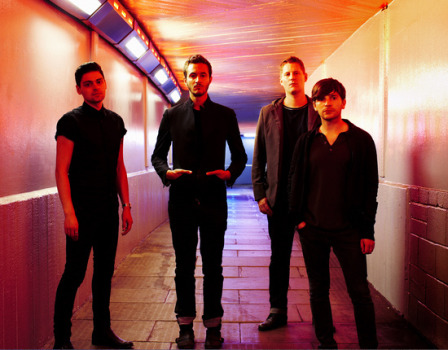1) In This Light and on This Evening; 2) Bricks and Mortar; 3) Papillon; 4) You Don’t Know Love; 5) The Big Exit; 6) The Boxer; 7) Like Treasure; 8) Eat Raw Meat = Blood Drool; 9) Walk the Fleet Road
Rock band goes electronic, again! But in this case it sounds like the band actually figure out their own sound through it, and add some great new touches to their songwriting.
Key tracks: "Bricks and Mortar", "Papillon", "Eat Raw Meat = Blood Drool"
Editors’ career up until this point hadn’t been a cry for originality and at first glance In This Light and on This Evening isn’t changing the trajectory either. By the late 00s the concept of rock bands trading their guitars for synthesizers had already become a well-realised trope and given their track record, Editors predictably doing what a lot of their peers were wasn’t a surprise. But here’s the kicker: by realising that there was only so much they could do by continuing with their old sound and that a shake-up could be beneficial, for the first time Editors actually sound like they’re blooming into something of their own.
The sound of In This Light and on This Evening may not be original but it’s one that suits the band perfectly. Chris Urbanowicz’ identifiable but rather one-trick signature guitar sound is gone and replaced by an array of synthesized sounds and keyboard textures, Tom Smith’s low-tone crooning is far more in its element among the synths than it is fronting stadium-bound guitar choruses, and the machine-precise post-punk energy of the rhythm section is a perfect fit to back the new lead instrument. This has the unexpected result that suddenly, the once rather monotonours Editors have actual variety within their songs - each track features its own identifiable sound and tone courtesy of whatever settings Urbanowicz and Co have discovered suits best for it, and the band’s range has grown enormously as a result. Take for example the late album highlight “Eat Raw Meat = Blood Drool”, a deranged singalong carried by a mechanic pounding and an off-kilter organ: the Editors of old could have never even attempted anything like it, but now they can and they sound positively invigorated by the prospect. There was a certain kind of emotional aloofness to the first two albums where the band only occasionally seemed audibly connected to their own material but they have a whole new fire under their belly here, even while the atmosphere of In This Light and on This Evening is often intentionally distant. Smith in particular is singing his life out here after staying relatively reserved previously, shedding away the Ian Curtis soundalike wannabe tag that followed him earlier on.

The impact of In This Light and on This Evening for Editors can’t be understated. The first two albums are good on their own right, but they’re also incredibly of their time right to the point that they could have turned Editors into a pop culture footnote had something not happened. With In This Light, Editors finally found their own voice, or at the very least discovered the first steps towards it. There’s a marked difference in the band and especially Tom Smith starting from this album, one that goes beyond a superficial sound switch. The key importance of In This Light and on This Evening ultimately isn’t its synths, obvious as that might be: they were just a tool for the band to discover and focus on new sides of themselves. The arrangements, the tone and even the song structures here are markedly different from the previous albums, more ambitious and breathing more freely. It was a reinvention they needed in order to forge a new path for themselves; and as far as reinventions go, it’s a strikingly successful one. It’s not quite a mindblower of an album, but for the first time Editors have made a real shot at one.

No comments:
Post a Comment